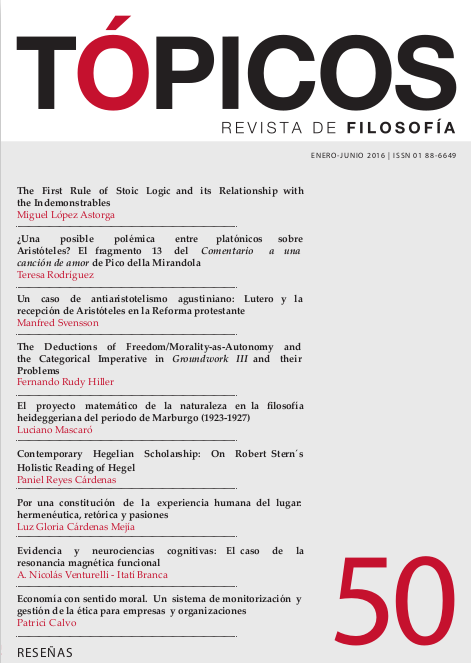El proyecto matemático de la naturaleza en la filosofía heideggeriana del período de Marburgo (1923-1927)
Publicado 2015-12-20
Palabras clave
- Heidegger,
- naturaleza,
- proyecto matemático,
- ciencia
Cómo citar
Resumen
El término “naturaleza” se muestra como una noción problemática en la losofía de Heidegger anterior a los años 30. Este término recibe variadas interpretaciones a lo largo del período de Marburgo, las cuales aparecen de forma dispersa y poco articulada. Nuestra investigación se centra en la explicitación del sentido de naturaleza que opera como trasfondo para las tareas de las ciencias ónticas de lo intramundano, esto es, las ciencias naturales. El objetivo de este estudio será el de indicar —en un trabajo de articulación de tratamientos dispersos— en qué sentido se dice “naturaleza” en las ciencias naturales. El estudio mostrará que los dos sentidos predominantes en los que las ciencias ónticas comprenden el término son a) el de conjunto total de lo que está ahí ante los ojos [Vorhandenheit], y b) el de región ontológica abierta en un proyecto matemático de la constitución de ser de los entes.
Descargas
Referencias
- Bibliografía
- Heidegger, M. (1994). La pregunta por la técnica, en Conferencias y Artículos. E. Barjau. (Trad.) Barcelona: Ed. del Serbal. (alemán: Die Frage nach der Technik, en Vorträge und Aufsätze, Hrsg.: F.-W. von Herrmann, Frankfurt am Main: Vittorio Klostermann, -GA7- 2000 -1a Ed.-)
- ____ (1995). Phänomenologische interpretation von kants Kritik der Reinen Vernunft, Frankfurt am Main: Vittorio Klostermann (GA 25)
- ____ (1996). Kant y el problema de la metafísica. G. Ibscher Roth (Trad.) México: Fondo de Cultura Económica. (alemán: (1929). Kant und das Problem der Metaphysik, Frankfurt am Main: Vittorio Klostermann-1a Ed.)
- ____ (2000). Los problemas fundamentales de la fenomenología. J. J. García Norro (Trad.) (Prol.) Madrid: Trotta, (alemán: (1975). Grundprobleme der Phänomenologie, Frankfurt am Main: Vittorio Klostermann -GA 58- 1993 -1a Ed.)
- ____ (2002). Interpretaciones fenomenológicas sobre Aristóteles, indicación de la situación hermenéutica [informe Natorp]. J. A. Escudero (Trad.) Madrid: Trotta. (alemán: (1922). Phanomenologische lnterpretationen zu Aristoteles (Anzeige der hermeneutischen Situation) Frankfurt am Main: Vittorio Klostermann - 1a Ed.)
- ____ (2004). Lógica: la pregunta por la verdad. J. A. Ciria (Trad.) Madrid: Alianza. (alemán: (1976). Logik. Die Frage nach der Wahrheit, Frankfurt am Main: Vi orio Klostermann -GA 21-, 1995 – 1a Ed.)
- ____ (2006). Ser y Tiempo. J. E. Rivera (Trad.) Madrid: Trotta. (alemán:(1967). Sein und Zeit, Tübingen:Max Niemeyer Verlag, 1986. 1a Ed)
- ____ (2006b). Introducción a la Investigación Fenomenológica. J. J. García Norro (Trad.) Madrid: Síntesis. (alemán: Einführung in die phänomenologische Forschung, Frankfurt am Main: Vittorio Klostermann - GA 17-1994 - 1aEd.-)
- ____ (2007a). Prolegómenos para una historia del concepto de tiempo. Jaime Aspiunza (Trad.) Madrid: Alianza. (alemán: (1979). Prolegomena zur Geschichte des Zeitbegriffs, Frankfurt am Main: Vittorio Klostermann -GA 20-, 1994, 1aEd.)
- ____ (2007b). Los seminarios de Zollikon. A. Xolocotzi Yánez (Trad.) México: Jitanjáfora Ed. (alemán: (1987). Zollikoner Seminare. Protokolle- Zwiegespräche-Briefe, Frankfurt am Main: Vittorio Klostermann, 1994 – 1a Ed.)
- ____ (2007c). Principios Metafísicos de la Lógica. J. J. García Norro (Trad.) Madrid: Síntesis. (alemán: (1978). Metaphysische Anfangsgründe der Logik im Ausgang von Leibinz, Frankfurt am Main: Vittorio Klostermann -GA 26- 1990 – 1a Ed.)
- ____ (2008). El concepto de tiempo. J. A. Escudero (Trad.) Barcelona: Herder. (alemán: Der Begriff der Zeit, Frankfurt am Main: Vittorio Klostermann -GA 64-,2004 -1a Ed.-)
- ____ (2009). Tiempo e historia. J. A. Escudero (Trad.) (Ed.) Madrid: Trotta. (alemán: (1978). Der Zeitbegriff in der Geschichtswissenschaft (1915) y Wilhelm Diltheys Forschungsarbeit und der gegenwartige Kampf um eine historische Weltanschauung (Kasseler Vortrage. 1925) Frankfurt am Main: Vittorio Klostermann -1a Ed.)
- ____ (2010). Los Conceptos fundamentales de la metafísica. Mundo, finitud, soledad. A. Ciria (Trad.) Madrid: Alianza. (alemán: (1983). Die Grundbegriffe der Metaphysik, Welt, Endlichkeit, Einsamkeit. Frankfurt am Main: Vittorio Klostermann -GA 29-30, 1992 – 1a Ed.)
- Bibliografía secundaria
- Bast, R. (1986). Der Wissenschaftbegri Martin Heideggers im Zusammenhang seiner Philosophie. Tübingen: Frommann-Holzboog.
- Brandom, R. (2002a). Heidegger’s Cathegories in Sein und Zeit. Tales of the Mighty dead: Historical Essays in the Metaphysics of Intentionality. Cambridge, Massachusetts/ London, England: Harvard University Press.
- ____ (2002b). Dasein, the Being that Thematizes. Tales of the Mighty dead: Historical Essays in the Metaphysics of Intentionality. Cambridge, Massachusetts/ London, England: Harvard University Press.
- Escudero, J.A. (2000). Heidegger y la filosofía práctica de Aristóteles: de la Ética a Nicómaco a la ontología de la vida humana. Taula, quaderns de pensament. No 33-34, pp. 91-106.
- Gethmann, K. F. (1974). Verstehen und Auslegung. Bonn: Bouvier.(1991). Der existenziale Begriff der Wissenschaft. Zu Sein und Zeit, §69b. Gethmann, K. F (Hrsg.) Lebenswelt und Wissenschaft. Studien zum Verhältnis von Phänomenologie und Wissenschaftstheorie. Bonn: Bouvier.
- Guignon, Ch. (1983). Heidegger and the problem of knowledge. Indiana, USA: Hackett publishing company.
- Haugeland, J. (2013) Dasein Disclosed. Joseph Rouse (Ed.) USA: Harvard University Press.
- McDaniel, K. (2013). Ways of Being. David John Chalmers, David Manley & Ryan Wasserman (Eds.), Metametaphysics: New Essays on the Foundations of Ontology. Oxford University Press.
- Neumann, G. (1999). Die phänomenologische Frage nach dem Ursprung der mathematisch naturwissenschaftlichen Raumfassung bei Husserl und Heidegger. Berlin: Duncker & Humboldt Verlag.






